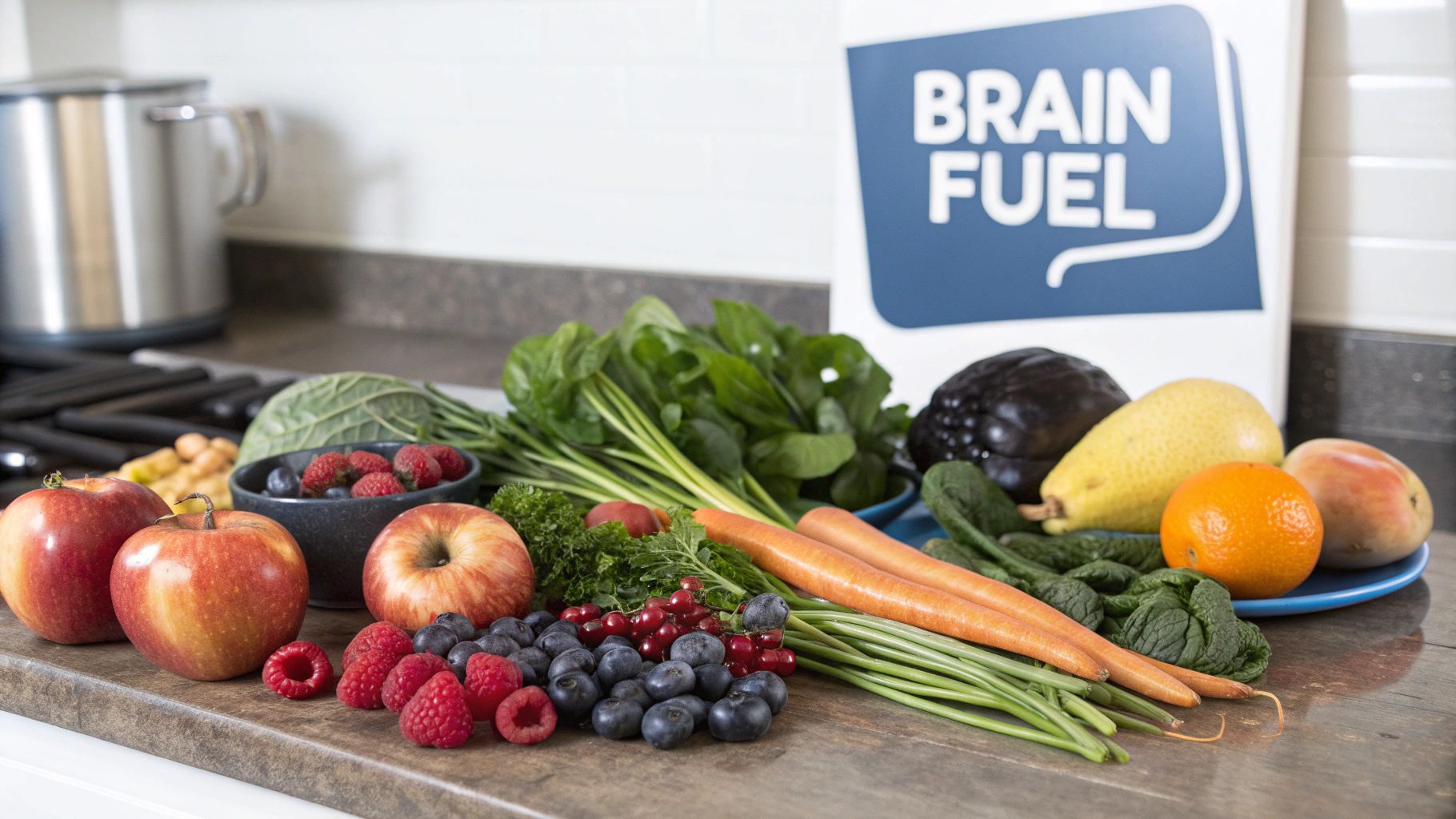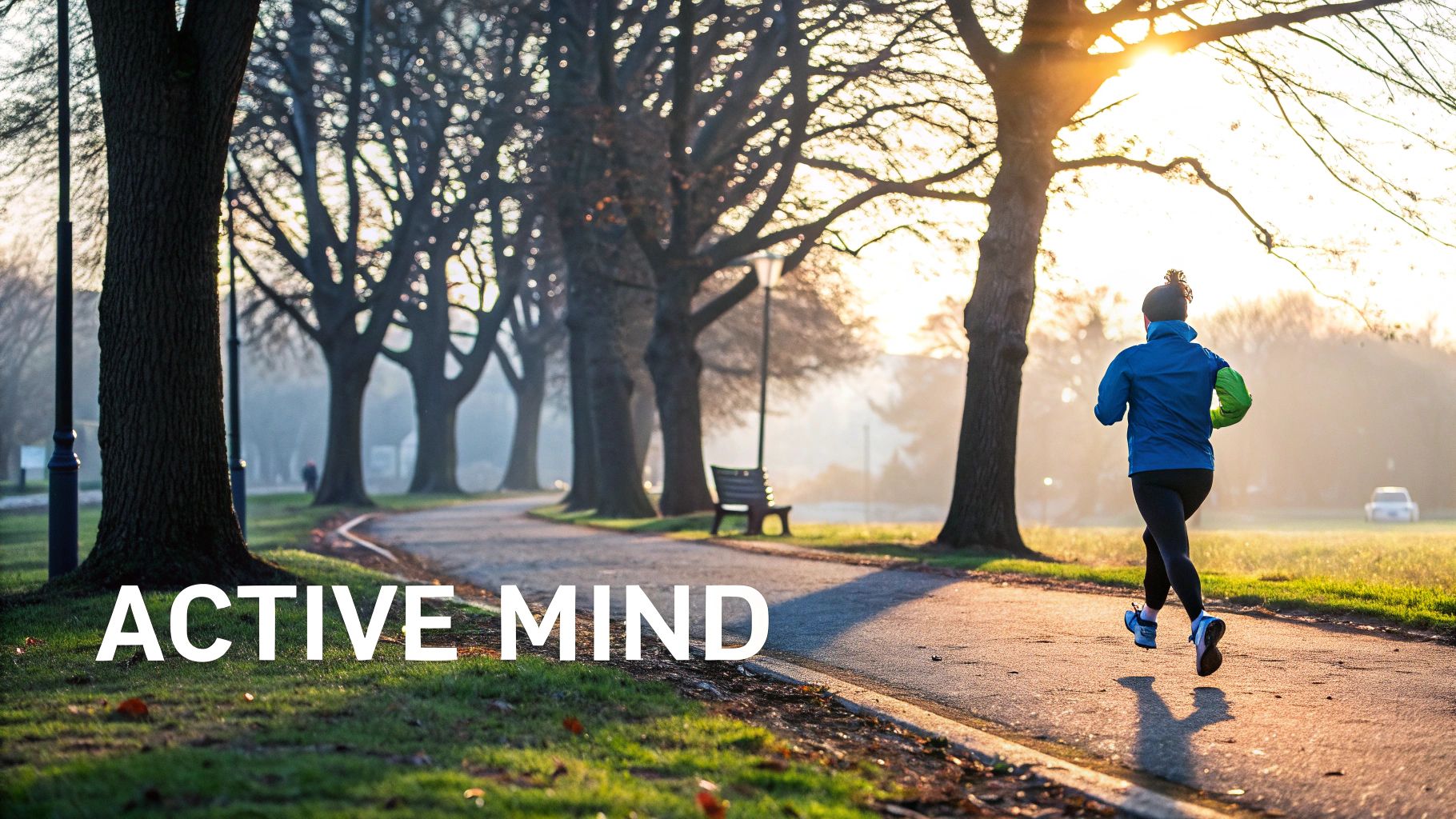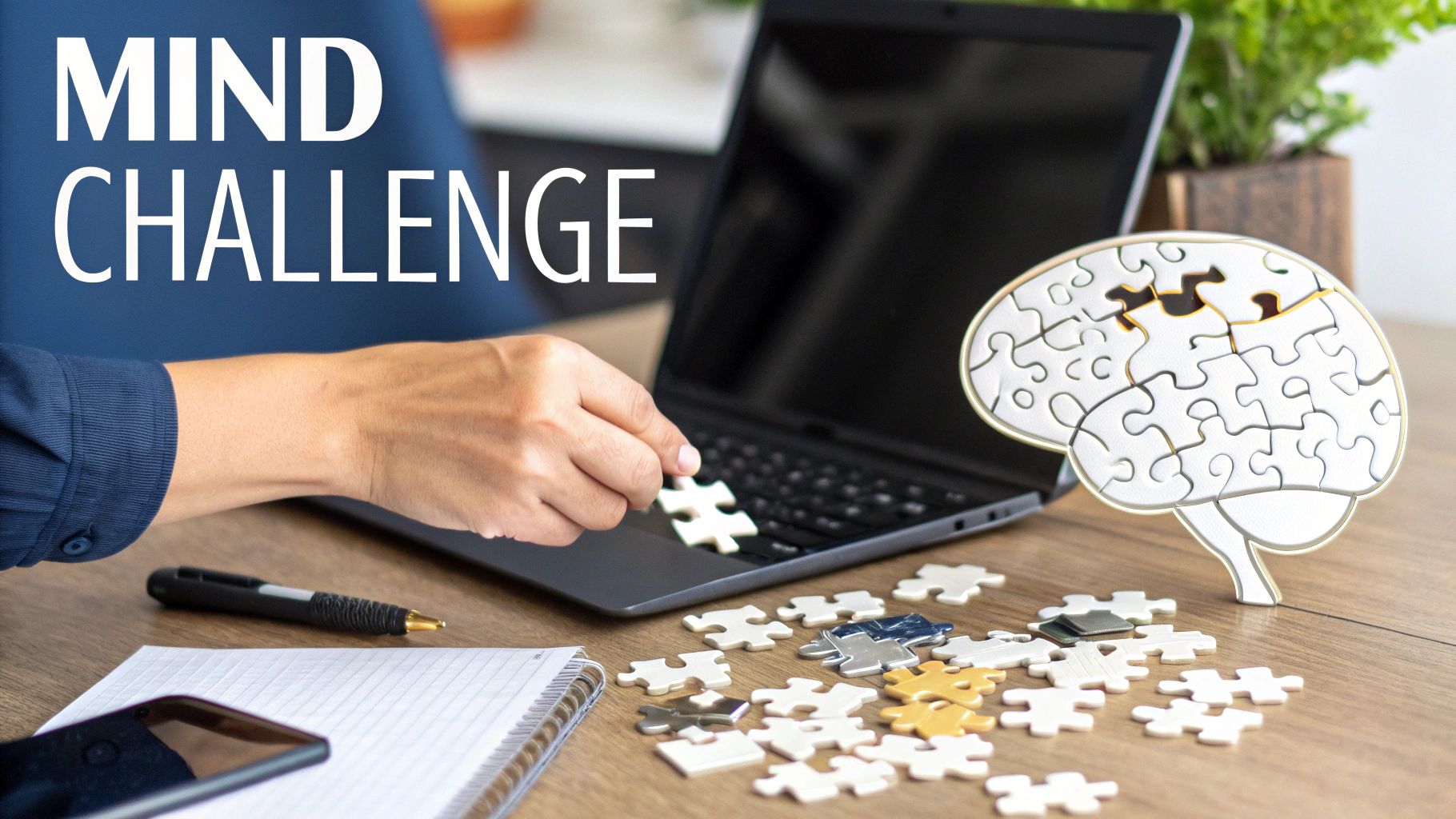Knowing how to improve cognitive function isn’t about finding a single magic bullet. It’s about building a consistent, well-rounded lifestyle that supports your brain from all angles. This guide provides actionable steps for combining smart nutrition, regular movement, mental workouts, and proper rest.
When you bring these elements together, you can sharpen your memory, boost your focus, and achieve that feeling of mental clarity we’re all after.
Your Practical Guide to Boosting Brainpower
That feeling of mental fog? It's more than just a minor annoyance. It's your brain signaling that it needs better support. The fantastic news is that you have a huge amount of control over your cognitive health, and it all comes down to actionable daily habits.
Forget chasing quick fixes. Real, lasting improvements come from nurturing your brain through four key pillars. What you eat provides the building blocks for your brain cells. Exercise gets blood flowing, delivering crucial oxygen and nutrients. Mental challenges forge new neural pathways, and quality sleep is when your brain does its essential repair work.
This guide breaks it all down into simple, actionable steps you can start with today. This visual gives a quick overview of a straightforward, three-part framework for your journey.
As you can see, improving your cognitive function is an ongoing cycle of checking in with yourself, putting good habits into practice, and seeing what works—not just a one-and-done task.
The Urgency of Brain Health in the UK
Taking proactive steps for brain health has never been more important. Here in the UK, cognitive decline is a real and growing worry. Recent data has shown that more than one-third of Britons are facing an increased risk.
The knock-on effects are massive, both personally and economically. The lifetime cost of lost earnings and healthcare needs is estimated at over £4.5 million per individual. You can read more about these findings on brain health in the UK on wecovr.com.
"Think of your brain as a muscle. Without consistent, varied exercise across all aspects of your lifestyle, its performance naturally wanes. The goal is to create a routine that strengthens it from every angle."
Taking a proactive approach doesn’t just help you feel sharper right now; it builds a solid foundation for your long-term mental vitality. It’s truly one of the best investments you can make in your overall well-being.
To get you started, here is a simple checklist summarising some of the key actions you can take each day across the four main pillars of brain health.
Your Daily Cognitive Function Checklist
Use this table to build simple, powerful habits into your daily routine.
| Pillar | Simple Daily Action | Why It Matters |
|---|---|---|
| Nutrition | Add a handful of walnuts or berries to your breakfast. | Provides antioxidants and omega-3s that protect brain cells from damage and support cell structure. |
| Physical Activity | Take a brisk 20-minute walk during your lunch break. | Increases blood flow to the brain, delivering essential oxygen and nutrients for optimal performance. |
| Mental Stimulation | Spend 15 minutes on a puzzle, learning a new word, or reading a chapter of a book. | Creates and strengthens neural pathways, improving cognitive flexibility and memory recall. |
| Rest & Recovery | Turn off screens at least 30 minutes before bed. | Allows your brain to enter deep sleep cycles, which are crucial for clearing toxins and consolidating memories. |
Making even one or two of these changes a regular part of your day is a brilliant first step. Over time, these small actions compound, building a stronger, healthier brain for the long haul.
Fuel Your Brain with Strategic Nutrition and Hydration
What you put on your plate is one of the most powerful tools for sharpening your cognitive function. The link between diet and brain health is undeniable; the right foods provide essential fuel your brain needs to build new cells, maintain focus, and protect itself from stress.
Let's move past generic advice and dive into specific, actionable changes. This isn't about a restrictive diet overhaul. It's about making intelligent swaps and additions to what you already eat—and you can find everything at your local supermarket.

Start by increasing your intake of omega-3 fatty acids. These are crucial for building brain and nerve cells. Oily fish like salmon and mackerel are brilliant sources. A simple action step: Swap one of your usual dinners for a piece of grilled salmon each week.
Foods That Fight Brain Fog
Beyond omega-3s, your brain thrives on antioxidants and other key nutrients that shield it from oxidative stress—a process that can damage brain cells over time. Weaving these foods into your diet can make a real difference to your mental clarity.
Here are simple actions you can take today:
- Add Dark Berries: Blueberries, blackberries, and blackcurrants are packed with flavonoids, which are antioxidants known to support memory. Add a handful to your morning porridge or smoothie.
- Incorporate Leafy Greens: Eat more spinach, kale, and broccoli. They're rich in brain-healthy nutrients like vitamin K and folate. A simple tactic is to wilt a large handful of spinach into whatever you're cooking for dinner, from curries to pasta sauces.
- Snack on Nuts and Seeds: Walnuts, in particular, are an excellent source of omega-3s and antioxidants. Swap your afternoon crisps for a small handful of walnuts or pumpkin seeds.
These small, consistent changes provide your brain with a steady supply of protective compounds.
The Overlooked Importance of Hydration
Staying properly hydrated is as critical as nutrition for peak brain performance. Even mild dehydration can wreck your concentration, impair memory, and bring on mental fatigue. When you feel that afternoon slump, a glass of water might be exactly what your brain needs.
Your brain is approximately 75% water. Keeping this balance is essential for everything from regulating your mood to processing information efficiently.
Aim to drink around six to eight glasses of water throughout the day. If you find plain water boring, infuse it with lemon, mint, or cucumber for a flavour kick. The goal is consistent sipping, not gulping a huge amount when you finally feel thirsty.
Nourishing Your Brain with Essential Minerals
Modern diets can sometimes leave us short on the vital minerals our brains need. This is where focusing on mineral-rich foods becomes essential for cognitive resilience.
Alongside the foods we’ve covered, it’s worth understanding the broader spectrum of nutrients that support your brain. To learn more, explore the benefits of trace minerals in our detailed article.
Create a brain-healthy shopping list as a practical first step. Next time you're at the shops, make a conscious effort to add a few of these items to your trolley. It’s not about perfection; it’s about progress. By fuelling your brain strategically, you're building a stronger, sharper mind.
Sharpen Your Mind Through Physical Movement
When you’re looking for ways to improve cognitive function, one of the most powerful actions you can take is physical movement. This isn't about gruelling gym sessions. It’s about weaving more purposeful movement into your daily life to directly boost your brain’s health and performance.
Every time you get your heart rate up, you send a rush of oxygen-rich blood to your brain. This boost in blood flow nourishes your brain cells and encourages the growth of new neurons, a process called neurogenesis.
Think of a brisk walk through the park. It’s not just a break for your body; it's a critical delivery service for your mind.

The science backs this up. Research here in the UK points to physical activity as one of the most effective ways to maintain and improve cognitive abilities, particularly as we get older. Consistent exercise has been shown to lower the risk of dementia by improving blood flow to the brain and supporting its overall health. You can read more about these dementia prevention findings from Healthy Suffolk if you want to dig into the details.
Weaving Movement into a Busy Schedule
If you have a desk job, breaking up long spells of sitting is non-negotiable. Our brains aren't built for hours of inactivity. The key is to build small, sustainable habits that keep you moving.
Here are practical actions you can start today:
- Try "Exercise Snacking." Instead of a whole hour, sprinkle in short, 5–10 minute bursts of activity. This could be a quick set of squats between meetings, a fast walk around the block, or taking the stairs.
- Set a Movement Reminder. Use your phone or watch to ping you every hour. When it goes off, stand up, stretch, and walk around for a couple of minutes. This simple act resets both your body and your focus.
- Embrace an Active Commute. If you can, try walking or cycling for part of your journey to work. It’s a brilliant way to build exercise into your routine and gives your brain a chance to wake up properly or wind down.
Remember, the best exercise for your brain is the one you’ll actually stick with. Find something you genuinely enjoy—whether that’s dancing, hiking, or swimming—and make it a non-negotiable part of your week.
What Type of Exercise Works Best?
While any movement is better than none, a mix of aerobic exercise and strength training delivers the most comprehensive cognitive perks.
Aerobic activities like jogging or cycling are fantastic for improving blood flow and heart health, which directly benefits your brain. If you're looking for guidance, our article on how to build cardiovascular endurance has some excellent starting points.
At the same time, strength training—like lifting weights or doing bodyweight exercises—has been linked to improvements in executive function (working memory, flexible thinking, and self-control). Starting with just two sessions a week can make a noticeable difference. Consistency is always more important than intensity.
Build Your Cognitive Reserve with Lifelong Learning
Think of your brain's cognitive reserve as a mental savings account. The more you deposit through learning, the better equipped your brain is to handle stress, adapt to change, and stay sharp. Building this reserve isn't about formal education; it's about making a habit of challenging your mind in new ways.
When you push yourself out of your mental comfort zone, you physically forge and reinforce neural pathways, making your brain more flexible and efficient. It's a hugely powerful strategy for improving cognitive function that is available to everyone, every single day.

This isn't just a theory. Cognitive reserve is your brain's ability to find workarounds when it faces damage or ageing. Groundbreaking research from the IDEAL project in Britain has shown that people with a higher reserve perform better on cognitive tasks and face fewer difficulties as they get older.
Inject Novelty into Your Daily Routine
Getting stuck in a mental rut is the enemy here. Pick activities that are not only fun but also genuinely demanding—they should grab your full attention and nudge you just beyond your current abilities.
Here are practical ways to get started:
- Learn a new language: You don't have to become fluent. Spend 10–15 minutes a day on an app like Duolingo. This introduces your brain to new sounds, vocabulary, and grammar, which is a fantastic workout.
- Tackle a complex recipe: Ditch the usual weeknight spaghetti. Cook something from a different cuisine that forces you to use new techniques or unfamiliar ingredients. This challenges your planning and problem-solving skills.
- Pick up a musical instrument: This is a multi-tasking challenge for the brain. Learning an instrument involves coordinating fine motor skills, reading music, and processing sound all at once.
The most important thing is to choose something you find interesting. That's what will keep you coming back.
"The brain thrives on novelty. Routine is the enemy of neuroplasticity. The smallest new challenge, from taking a different route on your walk to learning a single new word, contributes to a more robust and adaptable mind."
Strategic Hobbies for a Stronger Mind
When it comes to building cognitive reserve, not all hobbies are created equal. Look for activities that demand strategic thinking, creativity, and social interaction.
Try weaving one of these into your week:
- Play Strategic Board Games: Forget passive entertainment. Games like chess, Scrabble, or Settlers of Catan require you to think ahead, plan moves, and react to others.
- Engage with the Arts: Next time you're at a museum, don't just glance at the art—really look at it. Analyse the brushstrokes and composition. Or better yet, try sketching or painting yourself to fire up your visual and creative centres.
- Read Challenging Material: Step outside your usual genre. If you love thrillers, pick up a non-fiction book on a topic you know nothing about. This forces your brain to grapple with new concepts and information.
At the end of the day, every new skill you learn is another deposit into your brain's resilience fund. By making lifelong learning a fun and essential part of your life, you're making a direct investment in your long-term cognitive health.
The Critical Role of Rest and Stress Management
It’s easy to think that peak mental performance is all about intense focus. But your brain does some of its most important work when you’re switched off.
High-quality rest and smart stress management are the foundation of improved cognitive function. Without them, even the best diet and mental exercises will only get you so far.
Think of sleep as your brain's nightly maintenance crew. While you're resting, it's busy clearing out metabolic waste that accumulates during the day. This is essential for locking in memories—turning experiences into long-term knowledge—and letting you wake up feeling clear and ready to go.
Optimising Your Sleep for Better Brain Health
Improving your sleep is about creating an environment that signals to your brain that it's time to power down and start repair work.
Here are a few practical tweaks to turn your bedroom into a sleep sanctuary:
- Cool Things Down: Most people sleep better in a cool room. Set your thermostat to around 18°C. This helps your body’s internal clock regulate itself, encouraging deeper, more restorative sleep.
- Go for Total Darkness: Even a tiny sliver of light can disrupt melatonin production, the hormone that governs sleep. Use blackout curtains or a comfortable sleep mask.
- Manage Noise: If you're in a busy area, sudden noises can jolt you out of deep sleep. A white noise machine or earplugs can create a consistent, calming backdrop that masks disruptive sounds.
Making these small adjustments can have a massive effect on your sleep quality, which you'll feel in your mental sharpness the very next day.
Taming the Cognitive Toll of Chronic Stress
Nothing dulls a sharp mind like chronic stress. When your body is stuck in 'fight or flight,' it pumps out cortisol. Over time, this stress hormone can impair brain function, disrupt memory, and leave you feeling mentally exhausted.
Learning to manage your stress is about actively protecting your brain from long-term damage.
One of the most effective techniques is the 4-7-8 breathing method. Inhale quietly through your nose for four seconds, hold your breath for seven seconds, and then exhale slowly through your mouth for eight seconds. Repeating this just three times is often enough to feel your nervous system calm down.
For a deeper look at other practical strategies, our guide to achieving natural stress relief has plenty more techniques you can build into your day. Taking downtime and actively managing your stress response is non-negotiable for keeping your mind in top condition.
Got Questions About Brain Health? We've Got Answers
As you explore ways to sharpen your mind, it's normal to have questions. Let's tackle some of the most common ones with clear, practical answers.
How Quickly Can I Actually Expect to See Results?
The honest answer is: it depends. The timeline is tied to your starting point and, most importantly, your consistency with new habits.
Some people feel sharper within weeks of improving their nutrition, sleep, and exercise. Fixing mild dehydration can boost concentration in just a few hours.
But building a truly resilient brain is a long game. The magic is in consistency. Small, daily efforts—a brisk walk, a handful of berries, daily mental exercises—add up over time. Their cumulative effect over months and years creates the most significant and lasting benefits.
Are Supplements Really Necessary for a Healthy Brain?
Think of it this way: a balanced, whole-food diet is your non-negotiable foundation. You can't out-supplement a poor diet. That said, certain supplements can offer targeted support.
A key example is Omega-3 fatty acids, especially DHA, which is a structural component of the brain. Others that can play a powerful supporting role include:
- B Vitamins: B6, B9 (folate), and B12 are essential for nerve health and brain communication.
- Vitamin D: Many people in the UK are deficient in this "sunshine vitamin," which is important for mood and brain function.
- Antioxidants: Flavonoids, the compounds in colourful plants, help protect brain cells from daily wear and tear.
Always talk to a healthcare professional or registered nutritionist before adding any new supplement to your routine. They can ensure it’s the right fit for you.
Do Those Brain Training Games Actually Work?
Here's the deal with brain training games: they absolutely make you better… at that specific game. If you practise a memory puzzle daily, your score on that puzzle will go up.
The real question is whether getting good at the game makes you smarter in everyday life—a concept called ‘far transfer.’ The science is mixed. But the core principle is solid: engaging your brain with new and challenging activities is always a good thing.
The best strategy is to mix it up. Don't just master one type of puzzle. Combine brain games with learning a real-world skill, like a new language or how to play the guitar. This builds a much more flexible and well-rounded cognitive toolkit.
Is It Too Late for Me to Start If I'm a Bit Older?
Not a chance. It is absolutely never too late. Your brain has an incredible ability to rewire itself by forming new connections, a process known as neuroplasticity. This continues throughout your entire life.
It might feel tougher to pick up new skills as we get older, but the brain is still remarkably adaptable. Studies show that older adults who stay physically active, maintain social connections, and regularly challenge their minds see fantastic improvements in cognitive function. Every strategy in this guide is powerful at any age.
Ready to give your brain the premium, foundational support it deserves? The Oji Shilajit enhanced gummies are formulated with over 85 trace minerals, fulvic acid, and adaptogens like Lion's Mane to support your mental clarity and focus. Discover the difference for yourself at myoji.co.uk.








